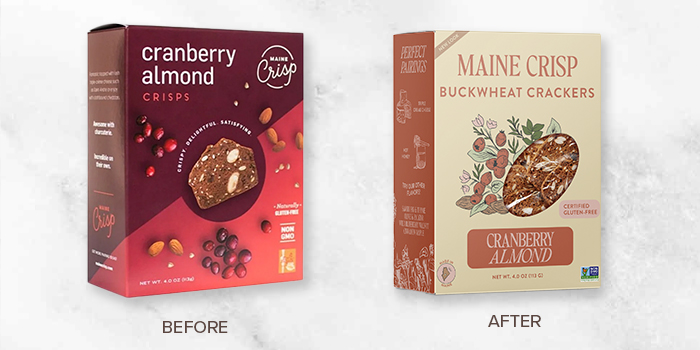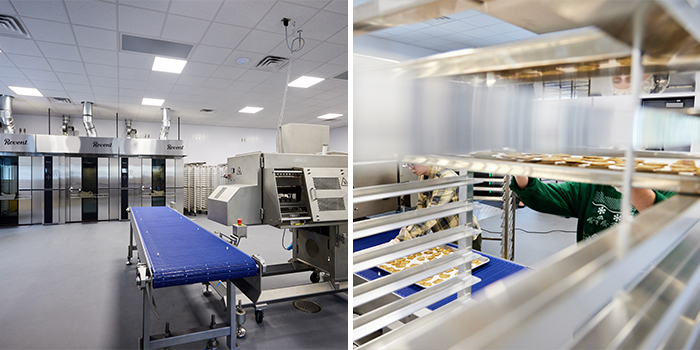Maine Crisp Co. Strategizes Growth As Buckwheat Bakery Brand

Snack manufacturer Maine Crisp Company is eyeing new baked goods categories as it seeks to scale with the support of a new production facility, distribution gains, updated packaging and an expanded leadership team.
“Our goal really is to continue growing the crisps we have now… but then also really bring [our key ingredient of] buckwheat to the forefront as a really healthful and environmentally friendly [ingredient],” said CEO Lewis Goldstein.
Goldstein, who joined in early November, brings expertise from various roles at Stonyfield as well as Sam Adams, and has served on Maine Crisps’ board since 2020. While the company’s current chairman Michael Ross temporarily served as CEO in 2018, Goldstein said he is the company’s first official chief executive since it was co-founded by Karen and Steven Getz in 2014.
As a result of Goldstein’s hire, the husband and wife team will shift their roles and responsibilities. Karen Getz, formerly the company’s president, will now serve as chief product officer. Steven Getz has transitioned from CMO to special projects manager where he has primarily been charged with managing and facilitating the renovation of the snack brand’s new Winslow, Maine production facility. Goldstein will manage the day-to-day operations of the business, he said, as well as look to bring in new investors and “focus the organization.”

The company opened its new gluten-free certified, 17,000 sq.ft. facility in October after nearly a year of renovations. The buildout was funded by Maine Crisp’s existing investor base as well as a range of grants and loans from the state of Maine, according to Goldstein. Now, he added, Maine Crisp can easily expand its 5-SKU portfolio of crackers and already has plans to launch a new holiday flavor later this month.
“We have a unique product with a unique form of manufacturing and the belief is that, by owning our own destiny through manufacturing, we [can] grow at the fastest rate possible, not rely on co-packers in a challenging environment, [and] we also can provide jobs in Maine.” explained Goldstein. “There are a number of grants and a number of economic opportunities the state of Maine provides to companies that build manufacturing in [the state].”
The company is also adding a retail storefront to the factory, though a timeline has not been set on that buildout. The intention with the retail store would also help drive brand awareness, Goldstein explained, much like the strategy of fellow Maine-based company Stonewall Kitchen. Maine Crisp may also eventually offer co-packing services; however, Goldstein emphasized that in the near term, it is focused on building the branded product line in brick-and-mortar and e-commerce.
“The former packaging really didn’t do justice to the product inside and the ingredients that are part of making it,” he said. “This package redesign is part of the journey – it’s a marathon, not a sprint. We’re at the beginning of that marathon, [but] what the new packaging allows us to do is really call out buckwheat in a clearer way on the primary panel.”
New products and categories are also on the horizon, added Goldstein. While he would not disclose exactly what formats are coming next, he said the brand is looking to increase its presence in the bakery set with products that shine a spotlight on the “benefits of baking with buckwheat.”
“I would say anywhere you think a consumer would love a grain-free, nutritious, great tasting product is a category that we are exploring entering,” he said.
In the past year, the brand onboarded with UNFI and KeHE to drive volume growth and increased door counts in its primary markets on the East Coast. Goldstein emphasized that the brand has focused its distribution to natural and specialty channels but also sells in grocery and mass retailers “known for selling quality natural organic products.”
As the business scales, Goldstein emphasized that the company will continue increasing its support of the local Maine community. Currently, it sources buckwheat from a Maine-based farmer and other ingredients from small farms located across the state. Goldstein hopes to continue supporting the production of buckwheat by raising awareness to the regenerative crop’s environmentally-positive attributes. Whether that is creating new manufacturing jobs by ramping up production or innovating with new locally-sourced ingredients, Maine Crisp said it will scale its mission alongside the business.
“It’s really important to us to try to support Maine and its agricultural industry,” Goldstein said. “Our goal is to support small family farms in Maine or outside as well as try to help support the Maine economy with new jobs. A critical part of our ethos is to give back while we grow. The more we grow, the more benefit we provide to both farmers and to people living in this area who have experienced some big industries leaving.”



















